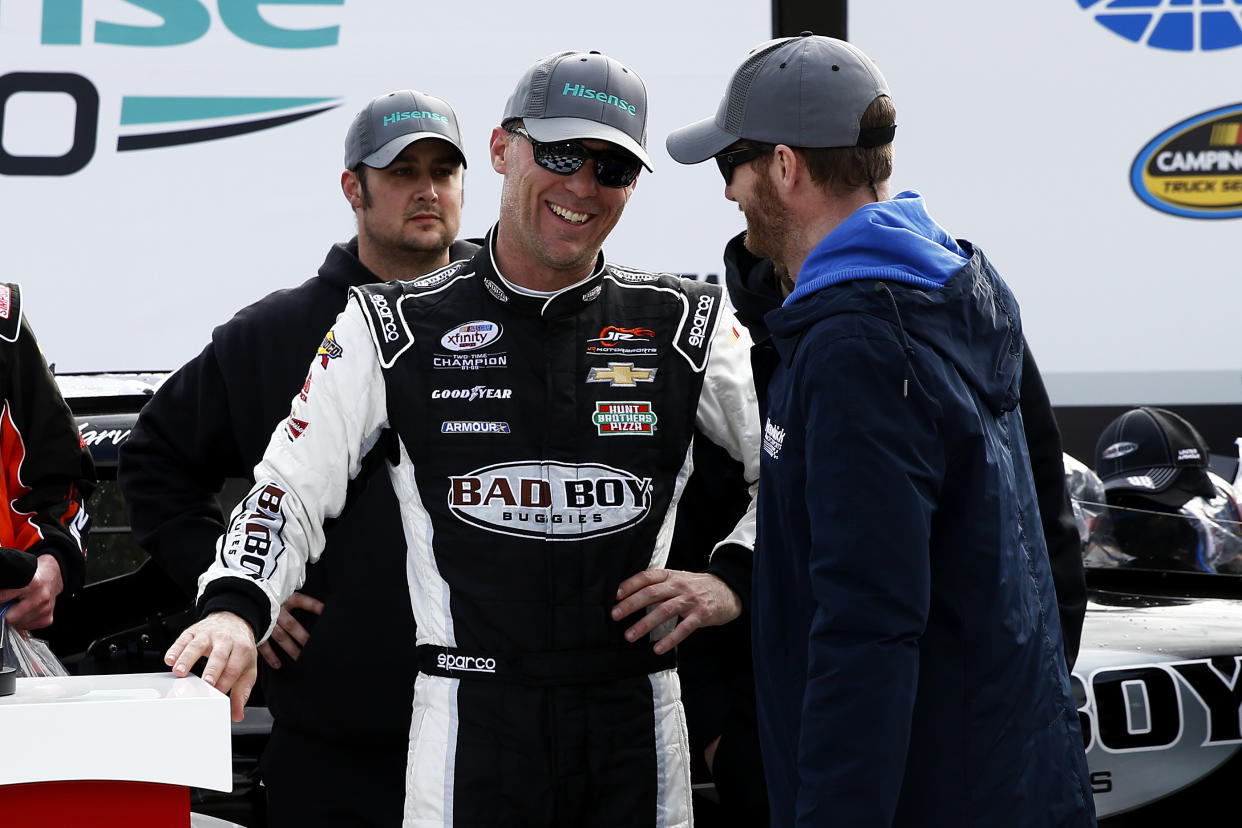Harvick unsure 'anybody in the garage' agreed with Junior's assessment of driver market

Kevin Harvick said he was just giving his opinion when he talked about the connection between Dale Earnhardt Jr.’s popularity and NASCAR’s.
Harvick told ESPN that he meant nothing “personal” when he theorized on his Tuesday radio show that Junior had “stunted” the growth of NASCAR because he hadn’t won a championship. After all, he said, Junior had given his opinion a few days earlier about the massive market correction regarding driver compensation. And Harvick was just giving his after a call from a fan.
“He had his opinions the week before on driver salaries and driver ages and those things, and I don’t know that anybody in the garage agreed with those, either,” Harvick said. “There’s definitely opinions on a lot of things, but it’s nothing personal. And I didn’t take anything that he said the week before personal, either.”
Here’s the thing; Junior was stating much more of a fact than Harvick was when he talked about how drivers aren’t going to get as much money in the future. Here’s what he said last week at Watkins Glen.
I’ll tell you one thing that’s new and that’s good. A lot of these young drivers are taking smaller contracts. You’ve got to look at guys like myself. There’s sort of been a major shift in how much drivers are getting paid. How they’re getting obviously changed with the new agreement we had a couple of years ago. Drivers started taking more of the purse. I don’t know everybody’s contract situation, but there is a less of a base and more purse-driven. But one thing that’s changed is that you’ve got a lot of young guys coming in being offered and accepting contracts that are a fifth to a tenth of what veterans are getting paid. And, that’s money that can go into the team, you know? These sponsors aren’t giving teams the money that they used to. So, the owners and everybody’s got to take a little cut. Everybody’s got to dial it back. Everybody’s got to realize that they have to accept some of that fallback and difference. And that’s the same with the drivers’ contracts. A lot of these veteran drivers are getting paid multi-million dollars; and a lot of these guys coming in are getting a fraction of that.
“Well, when you look at it, you’ve got a car, right? Say we all are sitting here with race cars and nobody to drive them. You’ve got a guy that you think has got a lot of talent, very young, a lot of potential. And then you’ve got a veteran who is established. But he wants three, four, five, or six times the amount of money. You’re going to go with the younger guy because it’s a better deal financially. So, that’s something that I think is transitioning in the sport. It took a while but when we had our major reset when the recession hit and everything sort of changed and the value of everything changed, the trickle-down affect I think is coming down through the drivers contract and it’s making a big difference in the decisions these owners are making. You can’t pay a driver five to eight million dollars a year if you ain’t got but $10 million worth of sponsorship. That ain’t going to work. Guys aren’t getting $20, $30, $40 million a year on sponsorship. Owners aren’t getting that anymore. Drivers are having to sort of understand that change is coming down the pike if it hasn’t happened to them yet, it’s going to happen to them. And the young guys, they don’t know any better. They want to race and they’re taking whatever they can get. That’s a good change for the owners. Somewhere in a quote years ago, I do believe I admitted to being overpaid (laughter). But I wasn’t going to complain. That’s a shift that’s going to be better for the sport and get those salaries into a realistic range for how much money we have from corporate America. All those things have to change, you know? Drivers’ salaries included. Yeah, all those drivers out there in the garage are going to say that’s easy for him to say.”
Harvick offered limited evidence for his theory that success in other sports is tied to an athlete’s popularity. And it’s worth noting that much mileage has been gained over the last 15 years by both fans and media hand-wringing over a lack of championships won by players like Peyton Manning and LeBron James.
The evidence supporting Junior’s comments is right in front of us. Erik Jones is replacing Matt Kenseth in the No. 20 car in 2018. Kasey Kahne, Junior’s teammate, is out of the No. 5 car in favor of William Byron. Junior is being replaced by Alex Bowman after his retirement at the end of the season. Bowman is undoubtedly making a fraction of what Junior is.
It’s understandable why Harvick doesn’t find Junior’s comments terribly appealing; he’s in the category of a veteran on a higher salary than many of his peers. If Harvick was a free agent at the end of the season and a team needed sponsorship to sign him, he wouldn’t have much salary leverage.
But while it may be uncomfortable for Harvick to admit that, it’s reality. Not just an opinion.
– – – – – – –
Nick Bromberg is the editor of Dr. Saturday and From the Marbles on Yahoo Sports. Have a tip? Email him at nickbromberg@yahoo.com or follow him on Twitter!



